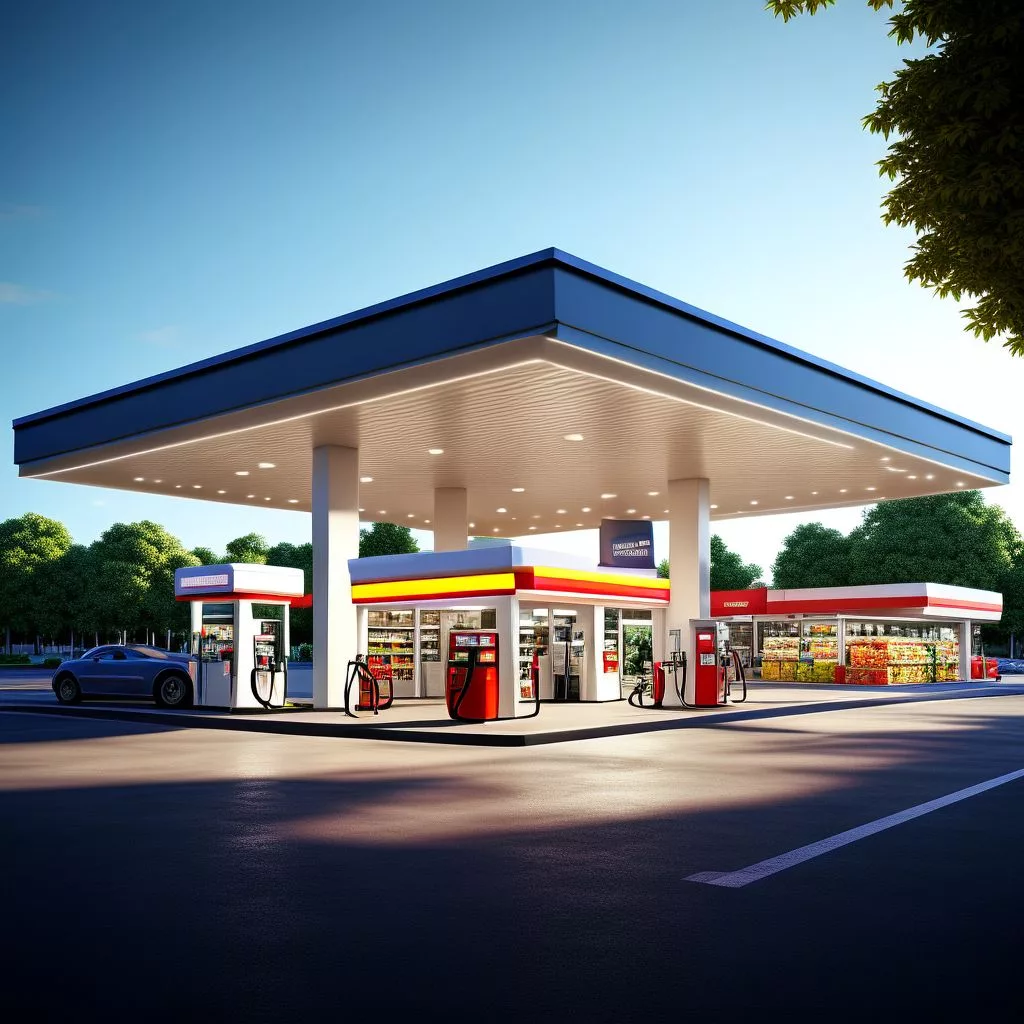Petrol stations in South Africa are transforming from simple fuel stops into vibrant lifestyle hubs. With fewer people buying fuel, these stations are now offering groceries, food, banking, and coworking spaces, making them gathering spots for communities. People visit these stations not just to fill their tanks but to grab coffee, pick up lunch, or even work with free Wi-Fi. This exciting change reflects a global push for convenience and sustainability, suggesting that petrol stations can thrive by adapting to new consumer needs. The future looks bright as these locations become essential parts of everyday life.
What is the transformation of petrol stations in South Africa?
Petrol stations in South Africa are evolving into multifunctional lifestyle hubs, offering groceries, food, banking, and coworking spaces. This shift is driven by declining fuel sales, changing consumer habits, and a global push for sustainability, reflecting a broader transformation in the retail landscape.
Petrol stations in South Africa are undergoing a significant transformation. These stops are evolving from simple fuel refilling points to bustling hubs of activity. This change is driven by shifts in consumer habits, technological progress, and a global drive towards cleaner energy. As fuel consumption declines worldwide, the role of petrol stations is being reimagined. They are no longer just spots to fill up your tank; they are becoming comprehensive lifestyle centers offering a range of services like groceries, food, banking, and even coworking spaces.
The Decline of Fuel Sales
A worldwide trend towards sustainable and efficient transportation has led to a drop in fuel sales, a trend that is also evident in South Africa. Despite an 8% reduction in fuel sales over the past five years, the number of petrol stations in the country continues to rise. This is primarily due to the growing revenue generated from non-fuel services. Karen Keylock from Nedbank notes that changing lifestyles, tech-influenced travel habits, and a global emphasis on cleaner mobility are driving this shift. By 2030, fuel retail is anticipated to decline by over 9%, whereas non-fuel services at petrol stations are projected to grow by more than a third.
The New Forecourt Experience
Petrol stations are now much more than places to refuel vehicles. South Africans visit these stations around ten times a month, and it’s not just for fuel. Statistics show that 74% of these visits are for groceries, 68% for fast food, and many for services like banking and coffee. This change in consumer behavior indicates that petrol stations are evolving into lifestyle hubs. The Fuel Retailers Association advocates for this shift, emphasizing a focus on customer experience. Mark Wohltmann, a retail expert, highlights that successful stations need to create inviting spaces where people want to spend time. Comfortable seating, quality coffee, coworking areas, and warm interiors are becoming standard features in colder climates, while brighter, open designs are favored in sunnier locations.
Global Examples and Local Potential
Countries like Japan, Brazil, and Thailand are at the forefront of transforming petrol stations into social and retail hotspots. For instance, Thailand’s Café Amazon, which started inside petrol stations, has grown to become the sixth-largest coffee chain globally. This success story demonstrates the potential for South African petrol stations to thrive if they adopt a similar approach. According to Wohltmann’s informal research, while many stations offer basic amenities like filter coffee and quick eats, only a few provide a full café experience with barista-made drinks and comfortable seating. To succeed in this new landscape, South African fuel retailers need to think beyond petrol pumps and more like lifestyle brands.
Infrastructure and Supply Challenges
South Africa’s quick transition to becoming a net importer of fuel has brought about supply issues, necessitating new infrastructure for fuel storage and transportation. According to Bloomberg, the country’s refining capacity has decreased due to industrial mishaps and the upcoming implementation of new low-sulfur fuel requirements. The closure of Engen’s oil refinery in 2021 and the lack of feedstock for PetroSA’s gas-to-liquids facility have further strained fuel production. These challenges highlight the need for significant investment in aging facilities to meet future demand.
The Role of Technology and Design
Technology is crucial in the ongoing transformation of petrol stations. Modern forecourts are using digital solutions to enhance customer experiences. Mobile apps for payment and ordering, high-speed internet for coworking spaces, and digital menus for food and beverages are becoming standard features. Design also plays a critical role in attracting customers. Forecourts need to be aesthetically pleasing and functional, with layouts that facilitate easy navigation and quick access to various services.
The Future of Forecourts
Looking forward, the future of petrol stations appears promising. As cities become more densely populated and homes smaller, petrol stations are well-positioned to fill the gap left by disappearing corner stores and traditional cafes. The new rule is simple: if you’re not offering coffee, groceries, or high-speed internet, you’re probably missing out on significant revenue opportunities. This new business model not only meets evolving consumer needs but also ensures the sustainability of petrol stations in an era of declining fuel sales.
Anecdotes and Observations
Driving through Johannesburg, the transformation of petrol stations is hard to miss. A Shell station that once offered just petrol now boasts a cozy café with barista-made coffee, a grocery section stocked with fresh produce, and even a small coworking space with free Wi-Fi. Regulars like Thabo, a young professional, no longer visit just for fuel. “I come here to grab a quick lunch, catch up on emails, and sometimes even meet clients,” he says. This shift isn’t just about convenience; it’s about creating a community space where people can connect and find everything they need on the go.
In essence, petrol stations in South Africa are undergoing a radical transformation. They are becoming multifunctional hubs that cater to a wide array of consumer needs. This evolution is driven by declining fuel sales, changing consumer behaviors, and a global push for more sustainable living. By embracing this new model, South Africa’s forecourts can not only survive but thrive in the years to come.
This metamorphosis of petrol stations into lifestyle hubs marks a significant shift in the retail landscape. It represents a new way of thinking, one that prioritizes customer experience and convenience over traditional sales metrics. As we move forward, it will be fascinating to see how these changes continue to unfold and shape the future of fuel retail in South Africa and beyond.
“`markdown
FAQ: The Transformation of Petrol Stations in South Africa
What is driving the transformation of petrol stations in South Africa?
The transformation is primarily driven by a decline in fuel sales due to changing consumer habits and a global push for sustainability. As more people opt for alternative transportation methods, petrol stations are adapting by offering a range of non-fuel services such as groceries, food, banking, and coworking spaces.
How are petrol stations changing their services?
Petrol stations are evolving into multifunctional lifestyle hubs. Customers now visit these stations not only to refuel but also to purchase groceries, enjoy fast food, access banking services, and utilize coworking spaces with free Wi-Fi. Statistics indicate that 74% of visits are for grocery purchases and 68% for fast food.
What can we learn from global examples of transformed petrol stations?
Countries like Japan, Brazil, and Thailand have successfully turned petrol stations into social and retail hotspots. For instance, Thailand’s Café Amazon has become the sixth-largest coffee chain globally. South African petrol stations can thrive by adopting similar approaches, offering a full café experience and comfortable seating to encourage longer visits.
What role does technology play in the new forecourt experience?
Technology is crucial in enhancing customer experiences at petrol stations. Modern forecourts are incorporating digital solutions such as mobile apps for payments, high-speed internet for coworking, and digital menus for food and beverages. These innovations are essential for attracting and retaining customers.
What challenges are South African petrol stations currently facing?
The transition to becoming a net importer of fuel has led to supply issues and the need for new infrastructure. Factors such as the closure of major refineries and the implementation of low-sulfur fuel requirements have strained production capacities, highlighting the need for significant investment in aging facilities.
What does the future hold for petrol stations in South Africa?
The future looks promising as petrol stations are well-positioned to fill gaps left by disappearing corner stores and cafes. By diversifying their offerings to include coffee, groceries, and high-speed internet, these stations can capitalize on significant revenue opportunities, ensuring their sustainability in an era of declining fuel sales.
“`









